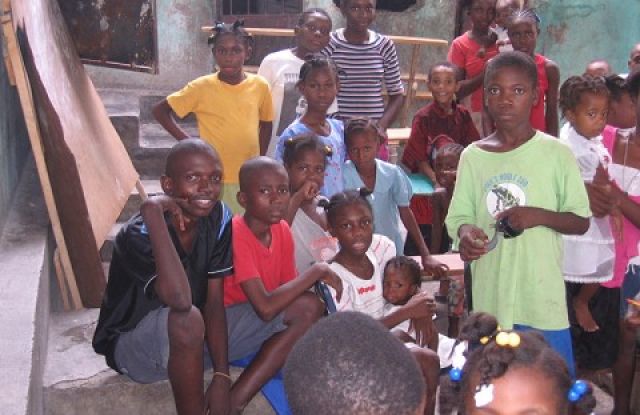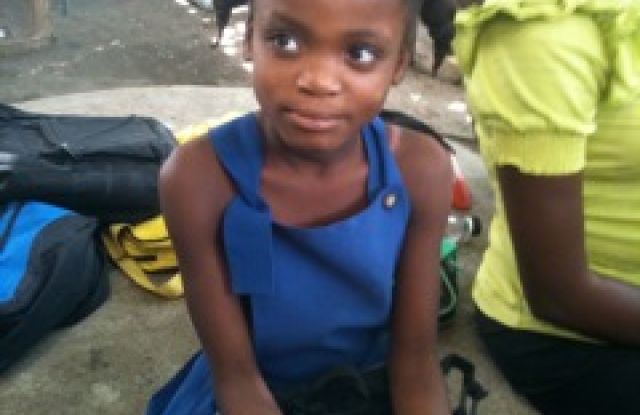

A community rises from the rubble
 Imagine a natural disaster hitting your neighborhood. A tornado or an earthquake wipes out all the homes and cars up and down your streets. Grateful to escape with your life, you comb through the wreckage and salvage a few bed sheets and photo albums. Together with your neighbors, you gather your children and walk a few miles to an open field and erect a lean-to, a camp.
Imagine a natural disaster hitting your neighborhood. A tornado or an earthquake wipes out all the homes and cars up and down your streets. Grateful to escape with your life, you comb through the wreckage and salvage a few bed sheets and photo albums. Together with your neighbors, you gather your children and walk a few miles to an open field and erect a lean-to, a camp.
There are camps like that all over Port-au-Prince. Little tattered villages in the dirt. As our team drove through the city, we stopped at a tent camp that was unregistered and unnoticed – no water source, no food. Everything they owned was buried in the rubble – they were instant refugees.
They call their tent city “Marassa 14.” 2500 people with nothing left in life. Together they pooled the few resources they had left to buy some bread.
We’d promised them we’d return today and pray for them. We brought them some food as well. We arrived at 8:45 on a Monday morning. You could hear the sounds of a full-blown church service already underway. Praise songs eminated from a makeshift tent. A guy was playing a small keyboard while three other guys wailed on a drumset.
Before long the place was up for grabs – people dancing and spinning and clapping. Grown men, little kids and old ladies dancing shuffle steps, throwing elbows back and forth, raising their arms, shouting “Hallelujah!” The smell of sweat and joy began to fill the space.
Pretty soon they stopped long enough to turn the microphone over to Jeremy and Rhett. Jeremy said, “While you continue to worship, we’d like to station ourselves around the tent to pray for you.”
For the next hour, the crowds overwhelmed us. Each interpreter translated for two of us simultaneously. A Haitian would step up, tell us about his or her issue through the interpreter, and then, once that person had begun praying, the interpreter would turn to begin translating for the other person.
We left exhausted – thankful that we’d been able to share their burdens and wondering what’s next for them.
What’s next will take a coordinated long-term effort with a number of partners:
A water filtration business or NGO
A micro-enterprise ministry
A church or churches
A home construction business or ministry
A short-term ministry to bring teams & resources
A clinic
A school
A leadership training ministry
If my neighborhood were destroyed, I’d hope for that kind of help. When everything has been wiped out, you need divine intervention, but with skin on it. You need a hand up. And if you’re one of those trying to help, you want to avoid the dependency trap. You just want to join God in what he’s doing.
As we left, I asked one of our translators, Obed, if he would work with the local committee to help put together a plan to rebuild Marassa 14 and its sister community. Obed is sharp. He’s an engineer who thinks planning and building. He’s a strong follower of Jesus. Working with Marassa 14 and a number of partners, I think the healing process can continue.
We’re committed to come back and to make a long-term difference. We’re committed to seeing the kingdom come in Marassa 14. In the months ahead, we’ll be sending church teams to come alongside Obed and the local committees. Let me ask you to consider joining God in what he’s doing.



we will be praying and fasting.
I think it is interesting you come across a brother, Obed, his name actually means servant, worshiper!!
Thank you Jesus for all you have done on this trip and for the plans and purposes, yet to be fulfilled. I pray for the church to rise up, and come along side our family in Haiti. I pray for a generation of servants of the Most High God to go out and serve in His name, like Obed! We are called to bear their burdens with them. So send us out Lord!
Thanks to you Seth, and your team for going.
Blessings!
“When everything has been wiped out, you need divine intervention, but with skin on it. You need a hand up. And if you’re one of those trying to help, you want to avoid the dependency trap.
–> You just want to join God in what he’s doing.”
Yes and amen. Thank you for this. God is accomplishing much through you and the AIM teams.
seth wow if you need someone to work with obed count me in from pounding nails to helping with logistics to project management no matter how small i am ready to give up my life of comfort here and join in this fantastic adventure the lord has put at our feet. coming in on the 28th of this month and just chomping at the bit to do his will.
hope you have the day your were meant to have and if you do i know it will be a blessed one.
bless u all
tim